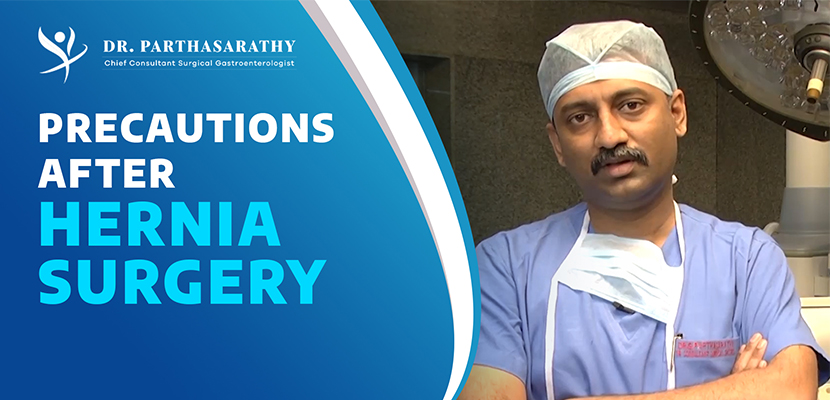Summary:
Today, we are going to collect and address some of the fears and doubts that patients have at the time of discharge after they undergo a hernia operation, and we will try to give answers to those questions. This will also include a complete list of do’s and don’ts after hernia surgery.
Table Of Contents
- How many days of bed rest is needed after hernia surgery?
- Can I go to the gym after a hernia operation?
- Can I use an Indian toilet after hernia surgery?
- What diet should follow after a hernia operation?
- How to prevent my hernia from coming back after operation?
Common Questions: Do’s & Don’ts After Hernia Surgery
How many days of bed rest is needed after hernia surgery?
It is a myth that after one major operation, one has to be under complete bed rest and should not move out of the bed. It is a myth and, it does more harm than good to the patients. In fact, we strive very hard to achieve early mobilisation of patients. Even on the same day of surgery, we make the patients get out of bed and get them walking. Thus, the advantage this has is that, when the patient starts walking, his breathing improves, the blood flow from the leg starts flowing to the heart and thereby, the chances of any blood clot developing in the lower limbs, which is called as Deep Vein Thrombosis, is less. The patient’s intestine starts functioning earlier, and their appetite is returned earlier. It also gives a lot of psychological strength to the patient to be able to recover faster. Thus, one advice that I always give to my patients is, “You do not need absolute bed rest”. Of course, they should not be doing any strenuous exercise, but all patients after a hernia operation, be it laparoscopic hernia surgery or open, should be encouraged to get out of bed as much as possible and move around.
Absolute bed rest is no longer recommended for hernia operations. We give adequate pain relief in the form of painkillers when the patients go home. Hence, that should take care of the pain factor ,and they should encourage themselves to get out of bed and be on the move and thereby, they shorten their recovery time.
Can I go to the gym after a hernia operation?
Hernia is a problem that can afflict patients across age groups, starting from young children and young fit adults to old people. Hence, when most of the young adults i.e. the health conscious young adults, who have the habit of doing regular exercises and go to gyms, get a hernia, they get psychologically very demoralised thinking that once they get a hernia and undergo a surgery for hernia, they will no longer be able to go back to the gym and do those exercises. Thus, a common question that we face is, “Can I go to the gym after hernia operation and if yes, when can I go?” After a laparoscopic groin hernia repair, patients can resume their day-to-day activities on the third day of surgery. Day-to-day activities which means all their regular routine such as walking on a flat surface or even climbing a few steps, using the toilet, getting out of bed on their own…these are all their daily activities…all these can be resumed from the third day. In a week, they are fit to go out of the house, to even drive for short distances and go for outdoor walking. In a month generally after three to four weeks, the patients are encouraged to resume jogging or walking. We generally ask them not to start doing weight – training exercises. From six weeks onwards, patients can start doing more strenuous exercises, and from three months, fit young patients, who have been used to weight training, can go back to the gym and start doing weight training. For an uncomplicated, inguinal laparoscopic hernia repair, by three months, the patients can get back to their original routine of daily activities and exercises, be it cardio or weight training.
There are no significant restrictions to these activities after three months. They can do cycling, all outdoor exercises, activities and sports, three months after the original operation. Now, coming to an open hernia operation, the recovery time might take slightly longer. However, the patients are encouraged to start doing abdominal exercises three months from the time of surgery as the abdominal muscles become weak when they have the hernia. After the hernia repair, it is essential that these muscles must regain their strength to get a very good success rate in the long term. When we do open operations for large abdominal hernias, we generally advise them not to go for any heavy weight lifting exercises, but we encourage them to do abdominal strengthening exercises and cardio exercises. Thus, by the time of three to six months, patients who have undergone large hernia repairs can resume their exercises, jogging, and breathing exercises too.
Can I use the Indian toilet after hernia surgery?
Another common practical question that we face from a patient is, “Sir, I have only an Indian toilet at home, can I use it? I have undergone hernia surgery, Is it safe to use an Indian toilet?” The answer to this is, Yes. Squatting does not increase the chance of a hernia surgery failure. Indian toilet can safely be used by patients who have undergone hernia operation. Especially if the patient has undergone laparoscopic hernia repair, they are free to use both Indian and western toilets. If the patient has undergone an open operation for a very large hernia and the patient is overweight, during the initial phase of recovery, using an Indian toilet might be slightly difficult because of their inability to squat and to be able to get up from that position.
During initial phase of recovery time, because of the pain factor, we advise them to use a western toilet or get a custom-made stool for passing motions. However, once the pain decreases, usually after six weeks, all patients who have undergone hernia operation can use Indian or western toilet without any fear of developing any complications. However, one thing that the patients have to remember is, they should not be straining at stool. Thus, one advice that we give to all patients is, you must make sure that your fluid intake and fibre intake is adequate. Despite this, if patients have any problems with constipation, they should use a stool softener that we generally recommend for a period of six to eight weeks so that during healing time, they do not strain too much at stool. The type of toilet is generally not a major concern. However, having constipation and regular straining at stool might be harmful for a successful healing of hernia.
What diet should I take after a hernia operation?
After hernia operation, what sort of diet is recommended for these patients? Are there any major restrictions in diet or should they avoid certain foods to improve healing? Hence, there are a lot of dietary myths among our patients when it comes to recovery from a surgery. There are a lot of people who feel that they should not take certain types of pulses, they should not take certain non-vegetarian food and there are chances of infection if they take certain diets. There are no major dietary restrictions after a hernia operation. Hernia operation is done on the abdominal wall, on the muscles of the abdomen. We do not touch or tackle the intestine… so the digestive track in a hernia operation. Thus, we advise patients to take a very high protein diet because we need the tissues to rebuild, we need the muscles to rebuild, and we need a good recovery of the muscle strength after hernia operation. Hence, they are advised to take a very high protein diet. Vegetarians are advised to take alternative sources of protein or even a protein supplement.
There are no restrictions on taking a non-vegetarian diet or meat after a hernia operation. They must take adequate fibre because, after hernia operation, it is always advisable not to have constipation. The stool has to be kept soft. Hence, they should be encouraged to take adequate fibre and adequate fluids. There is, as such no food item that is restricted or to be avoided after a hernia operation. Dietary advice may be different for a patient undergoing some other operation on the intestine where we have specific dietary charts made for them. However, as far as a hernia surgery is concerned, you need not worry. You eat whatever you want to eat. Make sure you take adequate protein, adequate fibre and good amount of fluids.
How to prevent my hernia from coming back after operation?
Most of the times, even before their first operation, the patient’s question is, “Sir, we will undergo the operation now, but how can we prevent hernia from coming back again?” It is definitely a very valid question. This fear of recurrent hernia is there in the mind of every patient who is undergoing a hernia operation, because the only thing a patient is scared of is having a hernia come back again or a recurrence where he has to undergo the entire process of undergoing another surgery and the tension along with it. Hence, we generally give some advices to the patients to avoid a chance of recurrence.
The first advice is that, during the initial recovery phase, for the first four to six weeks, the patients should strictly adhere to our dietary advice, the advice regarding activities, the activities to restrict and avoiding heavy weight lifting. They must make sure that they take a good high protein diet that helps in a faster tissue healing. They must make an attempt to have high fibre and high fluid intake so that they do not end up straining at stool, especially during the initial part of the healing where the tissues are getting set and that is a time where we do not want excessive straining. Smokers should avoid smoking completely after a hernia operation. Smoking is one of the major reasons why the hernia tissue which forms hernia …the fibrous tissue…or the cement…the body cement…the quality of this cement is drastically affected by smoking. Hence, whenever we see a hernia recurrence…usually many of them are smokers. Smokers have to completely start to stop smoking if they do not want their hernia repair to fail. They should avoid excess alcohol and try to keep the body weight in check. Hence, the patients, after surgery…if they start gaining a lot of weight… again the protein mass comes down, the muscle atrophy happens, and because of excess stretching, the hernia can come back again. Thus, these are the basic precautions one has to take to have a successful hernia repair in the long run. Good diet, adequate fluid intake, good care during the initial six weeks, complete avoidance of smoking and alcohol and avoiding excessive weight gain.
Reach us
Get an effective cure for hernia with low-risk procedures. Reach us via email or call us. Our specialist, Dr. Parthasarathy, is one of the most renowned laparoscopic hernia specialist in Hyderabad, India. He specialises in treating complicated hernias and failed hernias. He is widely experienced in the latest laparoscopic techniques of hernia repair. He has about 15 years of experience and has performed 3000+ advanced laparoscopic procedures.



